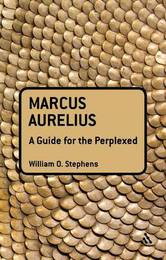
|
Marcus Aurelius: A Guide for the Perplexed
Hardback
Main Details
Description
This book is a clear and concise introduction to the Roman Emperor Marcus Aurelius Antoninus. His one major surviving work, often titled 'meditations' but literally translated simply as 'to himself', is a series of short, sometimes enigmatic reflections divided seemingly arbitrarily into twelve books and apparently written only to be read by him. For these reasons Marcus is a particularly difficult thinker to understand. His musings, framed as 'notes to self' or 'memoranda', are the exhortations of an earnest, conscientious Stoic burdened with the onerous responsibilities of ruling an entire, enormous empire. William O. Stephens lucidly sketches Marcus Aurelius' upbringing, family relations, rise to the throne, military campaigns, and legacy, situating his philosophy amidst his life and times, explicating the factors shaping Marcus' philosophy, and clarifying key themes in the Memoranda. Specifically designed to meet the needs of students seeking a thorough understanding of this key figure and his major work, Marcus Aurelius: A Guide for the Perplexed is the ideal guide for understanding this Stoic author - the only philosopher who was also an emperor.
Author Biography
William O. Stephens is a Professor of Philosophy and of Classical & Near Eastern Studies at Creighton University, Nebraska, USA.
Reviews"A very interesting and useful introduction to the life of Marcus Aurelius and to Stoic philosophy, which will prove rewarding reading for both the interested layman and the more serious student of Roman History. - A.A. Nofi, Editor, The NYMAS Review "Marcus's Meditations are a source of inspiration and curiosity. Why did Marcus write the book? What is the context and history of its authorship and dissemination? What are the book's central themes? How are these themes related to Stoicism and to the rest of ancient Greek and Roman thought? And what is the lasting significance and impact of the text? William O. Stephens's Marcus Aurelius: A Guide for the Perplexed does an admirable job of answering these questions. He details the historical context, shedding light on Marcus's life, times, and even geography (as maps are provided). He briefly discusses the reception of Marcus by subsequent philosophers. He relates Marcus's Stoic philosophy to the work of Heraclitus and Epictetus. And he analyzes the text from a variety of angles, including mereology, cosmology, philosophy of time, logic, and ethics. " --Andrew Faiala, New York Military Affairs Symposium
|